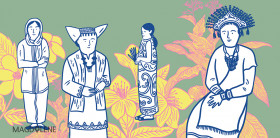Ara is a beautiful woman. Her smooth skin and pink pouty lips compliment a slim figure that graces every outfit she wears. With a degree in law, she's also known for her quick wit. Nobody would've thought that she'd be unlucky in love. But here she is, divorced after eight years of marriage and a beautiful daughter.
Ara quit her job at a law firm at the request of her husband. Now that he's left her, she has almost nothing to support herself. In Indonesia it's not easy to get back into the labor squad after years of absence, especially for a woman, despite having a university degree. Ara has tried to apply for a job and reached out to some old colleagues and employers, but when they got back to her, the salary offered would barely cover her transport.
The Religious Court that officiated the divorce only required her ex to pay a monthly support for their daughter, of whom she was awarded custody. No alimony. As if those years she'd spent taking care of her family meant nothing to the career advancement or the fat bank account of her husband, who is a member of a popular music group and who was relatively a nobody at the start of their marriage.
Her ex treats Ara like she meant nothing, too, like she was a blood-sucking leech who is trying to capitalize on the love they'd once declared to each other. Every time he's late on his support payment – and he's always late – and whenever Ara tries to remind him of his obligation to his own child, he scorns her. When he finally transfers the money, he says mean things: "You should bow before your daughter everyday. Without her, you'd be homeless, scratching for food on the street."
But Ara is luckier than Linda. At least she's still "allowed" to stay at the house she'd bought together with her ex, because it has been bequeathed to their daughter.
After 23 years of marriage, Linda was divorced when her husband was transferred to another province and met another woman. She and her three children were kicked out of her in-laws' house, the house they'd been living in because her ex could not afford one of their own. With only Rp 1 million (about US$83) of monthly support from her ex, Linda has to pay rent, tuition fees (two kids are in college, the youngest one is still in middle school), and figure out how to feed them.
Like Ara, Linda has also been hunting for a job. It has been three years, and is still fruitless so far.
When a marriage goes bad, it is hard for the woman to have a second chance in Indonesia.
"The problem is weak enforcement. There's no regulation to enforce what has been agreed on in the divorce court," said Indira Miranti, a lawyer at a prominent law office in Jakarta.
Indonesia recognizes religious and customary laws in marital affairs besides its civil laws. Muslim couples are regulated by the state's codification of Islamic laws called the Islamic Law Compilation, while non-Muslims, including the ones who conducted their marriage based on their own customary laws, follow the Civil Code.
"Joint property in general is seen as the property attained during a marriage, not including what a spouse had before the marriage and what a spouse had received as a gift or endowment," explained Indira.
However, the reality exists in shades of grey.
Article 128 of the Civil Code and Article 97 of the Islamic Law Compilation state that joint property should be divided evenly between the spouses in a divorce. But an interpretation of the Islamic Law actually doesn't recognize joint property because a wife's needs are supposedly the responsibility of a husband.
According to this interpretation, what had been attained in the marriage was mainly meant for the wife, except for things that the husband insists have not been intended for her. The couple then engages in a heavy negotiation, which in some cases like Ara's may leave the wife without alimony.
Article 156 of the Islamic Law Compilation only regulates financial support for the children, not to the ex-spouse, unless one of the feuding parties is a civil servant. Article 8 of the 1974 Marriage Law specifies that a state employee filing for a divorce must give one third of his income to his children and one third to his ex-wife until she remarries.
In practice, however, this makes the Religious Court claim the divorce fall under the jurisdiction of the State Administrative Court and vice versa. Some women whose ex-husbands work for the government have tried to claim their rights to alimony, and often ended up being ping-ponged between the two courts.
Couples governed exclusively by the Civil Code face equal complications. For example, the definition of "income" is described in three different regulations: the Government Regulation No. 24/1976, the Government Regulation No. 67/1991, and the Presidential Regulation No. 100/2006. This often leads to arguments over where the financial support comes from, whether only from official salaries, or from other incomes as well. In a country where corruption is rampant and unofficial income is common, it could be hard to determine the actual income of an individual.
The existing regulations do not specify the percentage of income a spouse should give as support. Both the 1974 Marriage Law Article 34 and the Islamic Law Compilation Article 80 say that a husband is only required to pay what he can afford. In Linda's case, her ex-husband stated that he could only afford to give her Rp 1 million monthly. The court has no basis to make him pay a more appropriate amount.
There are also no regulations to address the condition in which the wife is the main breadwinner in the household.
But as Indira has asserted, all these boil down to the lack of regulation to enforce what has been agreed in court, as well as the lack of a penalty system for those who don’t comply. Consequently, when their ex-husbands fail to meet their obligation to pay support, most women choose to let it go. The legal process can drag on and turn out very costly, sucking all their remaining money.
Compare it with the enforcement in some developed countries. In the US, for example, a simple report can make the court confiscate the financial estate of a negligent spouse, even giving him or her jail time.
Meanwhile, divorced women of certain age and with a child or more often face difficulties being employed. Past a certain age women with children are the least attractive to companies that perceive them as a burden to the bottom line.
Not that the government has done anything to improve this norm. The Labor Law Act 13/2003 guarantees the rights of workers and equal opportunity to employment for everybody, but, again, there's no enforcement. No sticks and carrots for the companies.
In some developed countries, Affirmative Action programs have helped curb discrimination against women, the minorities, the disabled, and veterans in the workplace. In the US, companies with more than 50 employees or over $50,000 worth of annual contracts with the government have to provide proofs that they abide by the affirmative program. The US Government also gives tax incentives to companies that hire previously unemployed people or part-time workers. These companies may qualify for a 6.2 percent payroll tax incentive based on Hiring Incentives to Restore Employment Act in 2010.
These kinds of breakthrough are what Indonesia needs. Otherwise, millions of women will choose to stay in bad marriages, enduring infidelity and abuses for fears they will be denied a second chance to build a new and successful life on their own.
About Chadijah Siregar
Chadijah used to write telenovelas, and now she lives in one. She's married to a cross of Sheldon Cooper and Peter Griffin with a hint of Sting, resulting in a super cute daughter. She's pursuing a (non-existent) writing career by being a couch potato. Also, she's a sweet woman.








Comments